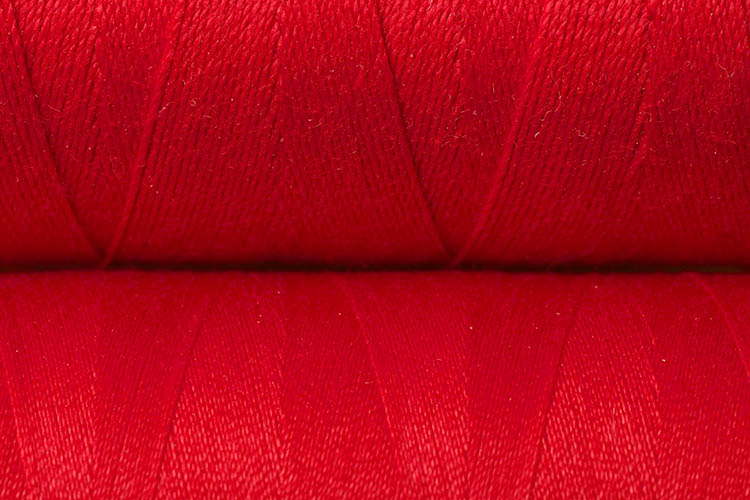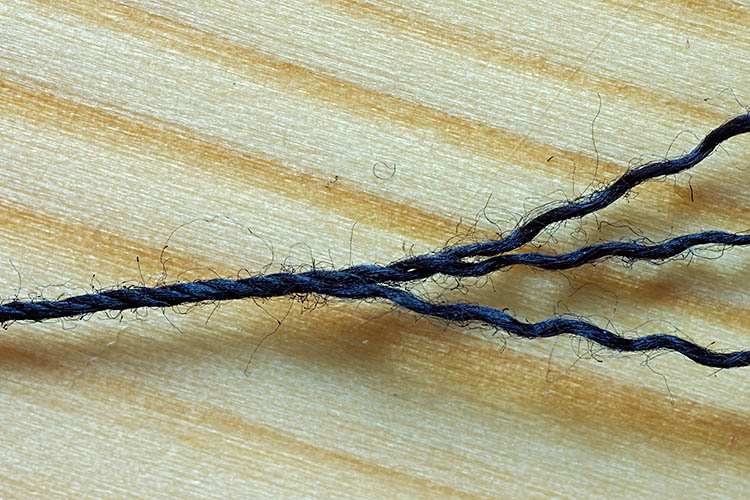
There are many ways to specify thread thickness. Thankfully the standards are well-defined with some units more common than other.
In Europe the most common ones are:
- Tex (dtex)
- Nm
- Tkt (number)
Tex is actually an SI unit which can be used on anything from tiny fibers to huge cables.
1 tex = 1 gram per kilometer.
So one kilometer of a thread of 1 tex weights 1 gram.
On fibers it's more common to use dtex (desitex) or 1/10 tex.
1 dtex = 0.1 tex, same way as 1 dl (desiliter) = 0.1 liter.
In other words 1 dtex = 0.1g per kilometer or 1g per 10km (10,000m).
Normal thickness of sewing threads are 30 tex (30 grams per kilometer).
Nm is somehow the opposite of tex. Nm means how many meters you have in 1 gram of thread.
Nm 50 translates to 50m in 1g thread.
Quite often you'll see Nm specified as a fraction, i.e. Nm 100/2.
The latter number represents the number of yarns the thread is made of.
Confused?
A thread is normally made by twisting together smaller yarns. Two are quite common on normal and thin threads while 3 are common on thicker threads.
Below is a photo of a thread made of 3 yarns.
In other words, Nm tells both the thickness and the make of the thread.
Nm 100/2 and Nm 150/3 have the same thickness (equals to 50m per gram), men they consists of respectively two and three smaller yarns.
Normal thickness sewing threads are Nm 66/2 (33m per gram, two yarns).
 This thread consist of 3 smaller yarns.
This thread consist of 3 smaller yarns.
Ticket is a simplified version of Nm.
It's often called just "number" and shortened as "tkt." or "no.".
Thread number equals to Nm/3 regardless of how many yarns they're actually made of.
Number 80 equals to Nm 80/3 (80 / 3 = 26,7m per gram) even though it may consist of only 2 yarns.
You can also say 80 meters weights 3 grams.
This is the most common way to express thread thickness.
Normal thickness sewing threads have number 100 (or tkt 100) (100 meters weights 3 grams).
Thread number 50 is twice as thick as number 100.
While tkt 200 is half the thickness of tkt 100.
Wt/weight is an American measurement, which is not so common in Europe but still good to know about.
It specifies how many meter thread per gram. Yes, the Americans had to invent their own measurements for everything, including sewing threads. Weirdly enough their thread weight (wt) is actually based on the metric system...
Normal thickness sewing threads are 33wt (1 gram is 33 meter long).
If you happen to stumble upon threads in wt and would like to know what thread number it equals to, a very simple way is just multiply wt by 3.
For instance are 40wt equal to number 120 thread.
(Even more weird is the rather misleading name of the US weight system. The actual weight of the measurements are always 1 gram. The number specifies the length you get out of that one gram of thread).
 TikTok
TikTok YouTube
YouTube